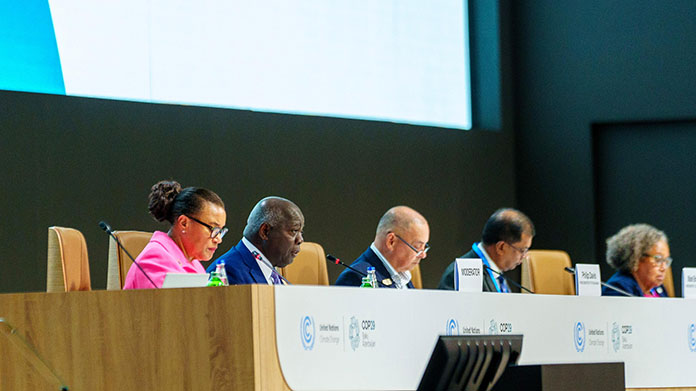
PM DAVIS: Our people have a right to survival.
They have a right to pass down to future generations a world better than the one they inherited.
And yet, this most basic right—this right to life, to hope, to continuity—hangs by a thread.
In this hour of crisis, it seems some would choose isolation over unity, self-interest over collective action.
But we, the nations most at risk, do not have the luxury to retreat.
The moment demands courage, vision, and a shared commitment to hold hands and confront together the fierce challenges that lie before us.
The evidence is stark.
This year alone, we have witnessed heatwaves, droughts, floods, hurricanes, and fires, —each event a part of a global pattern.
Yet still, there are those who look at these signs as if they are isolated moments, coincidence of bad weather, rather than the planet’s unmistakable call for action.
These are not mere a coincidence of nature; they are warnings, the earth’s way of showing us the high cost of inaction.
Every storm, every fire, every flood cries out that time is running out, and yet some choose to look the other way.
The catastrophes are not the product of fate, but of choices.
Colleagues,
I ask you, as I ask myself: What kind of legacy do we wish to leave? Will it be one of solutions or of regret?
The path forward is not complicated; it is simply inconvenient for some. The next round of Nationally Determined Contributions (NDCs) in 2025 is a moment that cannot be wasted. Current commitments are insufficient to keep us within a 1.5°C future; they will instead lead us to a world well beyond 2°C—a world in which SIDS may no longer exist.
Mitigation efforts in SIDS will not shift global emissions, but they hold immense value for us.
The implications for our economies, our people and our ecosystems are severe. Hard-won development gains are being undermined as schools, hospitals, housing, roads and bridges, much of which is constructed with significant multilateral loans, are destroyed before they are even fully paid for.
The costs of these catastrophes are growing exponentially and diverting resources away from investment in long term sustainable development.
We are confronting the stark injustices of a crisis we did not create – a crisis we cannot avert on our own, even if WE do everything WE can to limit emissions.
Most CARICOM Member States lack the fiscal space to mobilize the resources needed to recover from worsening impacts of climate change. How can we close the recovery financing gap, when a single hurricane can cause damage that amounts to multiples of GDP, as we have seen happen in our region?
Access to concessional financing remains out of reach for many of our countries, because of outdated eligibility rules based on GDP per capita. Even as we have reached agreement at the United Nations on a Multidimensional Vulnerability Index, we have yet to see International Financial Institutions commit to its use. Grants for adaptation take too long to access and are insufficient to meet the scale of our climate-resilient development needs.
We implore bilateral and multilateral partners to scale up resources for adaptation and loss and damage, and to ensure that SIDS can access these funds at scale, quickly, without excessive and costly bureaucracy, and in the form of
grants. Justice demands this. It is unconscionable that small island developing states should bear the brunt of a crisis climate crisis that we did not, and are not, contributing to.
SIDS have spent 18 times more in debt repayments than they have received in climate finance. The annual cost of damages from disasters is equal to an average of up to 8% of the entire GDP of SIDS, without considering the growing need for adaptation or the mounting toll of loss and damage.
Justice demands that the polluter should pay, not those who bear the burden of the pollution!
Adaptation funding must be prioritized; I call for 70% of climate finance to be directed to adaptation. This is not a request but a necessity. Adaptation is our right—our right to prepare, to protect, to persist.
Furthermore, the Loss and Damage Fund must become a tool of immediate relief, not a maze of
red tape. Bureaucratic delay is an injustice to every community left exposed and unprepared. We do not seek favors; we seek fairness. If we are to bear the consequences of a crisis we did not cause, then at least at least we must have the support necessary to face it.
Excellencies, this is our moment.
We are faced with a choice: to act with boldness and unity or to let fear and inertia decide our fate.
Let us not be remembered as those who turned away in the hour of need but as those who came together, who held hands across borders, and who fought for a world that honors the right to survival.
Thank you.








